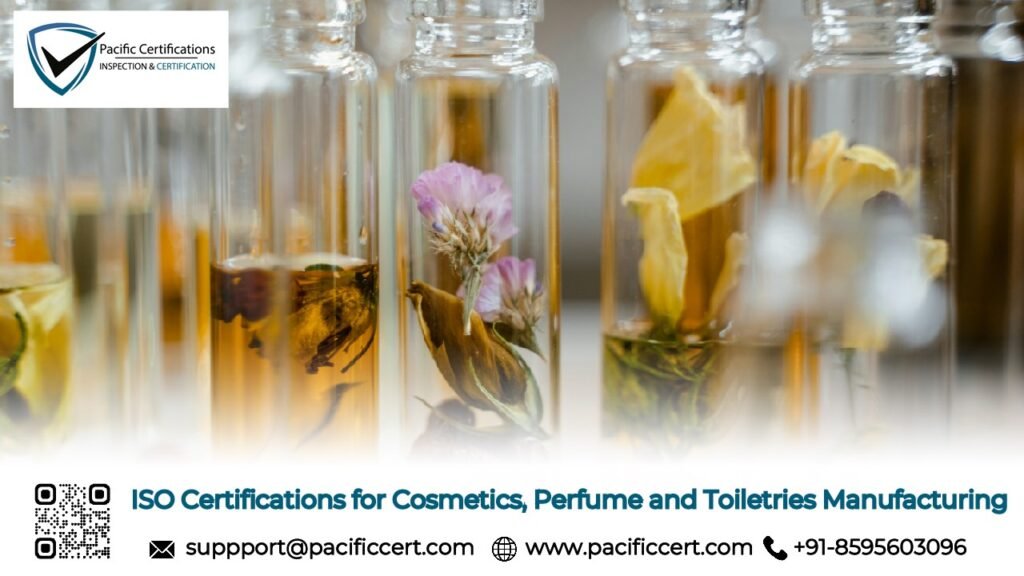
ISO Certifications for Cosmetics, Perfume and Toiletries Manufacturing Businesses, Requirements and Benefits
The cosmetics, perfume, and toiletries manufacturing industry operates in a highly regulated environment. Quality, safety & environmental compliance are crucial in these sectors to build consumer trust and ensure compliance with global regulations. ISO standards provide a structured framework for achieving these goals, setting high benchmarks for product quality, environmental management, safety and more. By adopting ISO standards, cosmetics and toiletries manufacturers can strengthen their market positioning, demonstrate compliance, and drive continuous improvement in their operations.
If you’re seeking ISO certification for your Cosmetics, Perfume or Toiletries Manufacturing business, contact us at support@pacificcert.com or call +91-8595603096. We’re here to help!
Applicable ISO Standards for Cosmetics, Perfume, and Toiletries Manufacturing
The cosmetics, perfume, and toiletries industry can benefit from a range of ISO standards, each addressing unique areas of compliance and improvement:
- ISO 9001:2015 – Quality Management System (QMS): ISO 9001 is the globally recognized standard for quality management systems. It outlines requirements for processes, product quality, and continuous improvement, ensuring that manufacturers deliver consistent, high-quality products. For cosmetics, perfume, and toiletries manufacturers, ISO 9001 focuses on customer satisfaction, regulatory compliance, and quality control across all stages of production.
- ISO 22716:2007 – Cosmetics Good Manufacturing Practices (GMP): ISO 22716 provides guidelines for the manufacturing, control, storage, and shipment of cosmetic products. This standard emphasizes Good Manufacturing Practices (GMP) specific to the cosmetics industry and ensures products are manufactured in safe and hygienic conditions. This standard is essential for cosmetics companies as it aligns with global regulations and helps build consumer confidence in product safety and quality.
- ISO 14001:2015 – Environmental Management System (EMS): ISO 14001 is the leading standard for environmental management systems. In cosmetics, perfume, and toiletries manufacturing, this standard helps organizations minimize their environmental footprint by managing resources efficiently, reducing waste, and complying with environmental regulations. Implementing ISO 14001 demonstrates a commitment to sustainability, which is increasingly important to consumers and stakeholders.
- ISO 45001:2018 – Occupational Health and Safety Management System: ISO 45001 provides a framework for improving workplace safety, reducing workplace hazards, and ensuring a safe environment for employees. The standard is beneficial for cosmetics and toiletries manufacturing companies, as it helps mitigate risks associated with handling chemicals, operating machinery, and other potential hazards in production environments.
- ISO 50001:2018 – Energy Management System (EnMS): ISO 50001 is designed to help organizations improve their energy efficiency, reduce energy costs, and lower greenhouse gas emissions. In the cosmetics and toiletries manufacturing sector, where energy consumption can be high, implementing ISO 50001 can lead to more sustainable production practices and demonstrate environmental responsibility.
- ISO 27001:2022 – Information Security Management System (ISMS): As companies in this sector often handle sensitive information, including product formulations and customer data, ISO 27001 can help secure their information systems. ISO 27001 establishes requirements for protecting information assets, managing data security risks, and ensuring business continuity.
- ISO 17025:2017 – General Requirements for the Competence of Testing and Calibration Laboratories: For companies that conduct in-house testing of products, ISO 17025 ensures that laboratories operate with a high level of competence and reliability. This standard applies to any laboratories involved in product testing and quality control, ensuring the accuracy and reliability of testing methods.
Click here to find out more applicable standards to your industry
At Pacific Certifications, we provide comprehensive certification services for cosmetics, perfume, and toiletries manufacturers aiming to achieve ISO compliance. With our team’s expertise and commitment to quality, we conduct thorough audits to assess compliance with ISO standards, identifying areas of strength and opportunities for improvement. By working closely with you, we guide you through each step of the certification process, from initial assessment to final certification.
Looking for ISO certification to boost your Cosmetics and Toiletries Manufacturing quality? Email us at support@pacificcert.com or give us a call at +91-8595603096.
Requirements of ISO Certifications for Cosmetics, Perfume and Toiletries Manufacturing
Below is a summary of key requirements associated with the most relevant standards:
ISO 9001 – Quality Management
- Documented quality management procedures and policies
- Regular quality audits and assessments
- Ongoing employee training and competency assessments
- Continuous improvement processes based on customer feedback
ISO 22716 – Good Manufacturing Practices for Cosmetics
- Safe handling of raw materials and ingredients
- Strict hygiene and cleanliness standards in production
- Employee training on GMP
- Documentation of processes to maintain traceability and accountability
ISO 14001 – Environmental Management
- Development of an environmental management policy
- Identification and mitigation of environmental risks
- Compliance with applicable environmental regulations
- Continuous monitoring and improvement of environmental performance
ISO 45001 – Occupational Health and Safety
- Hazard identification and risk assessment
- Implementation of safety protocols to protect employees
- Regular safety training and emergency response planning
- Continuous monitoring and improvement of health and safety performance
ISO 50001 – Energy Management
- Establishing an energy policy and objectives
- Tracking and analyzing energy usage and performance
- Implementing energy-efficient practices
- Conducting regular energy audits
ISO 27001 – Information Security Management
- Conducting information security risk assessments
- Establishing and enforcing data security policies
- Regular employee training on data protection and security
- Continuous monitoring and improvement of information security systems
ISO 17025 – Laboratory Testing and Calibration
- Validated testing and calibration methods
- Competency assessments for laboratory personnel
- Strict adherence to quality control measures in testing
- Documentation and traceability of test results
Ready to take the next step in quality and compliance? Get in touch for ISO certification for your cosmetics and toiletries manufacturing by emailing support@pacificcert.com or calling +91-8595603096.
Benefits of ISO Certifications for Cosmetics, Perfume and Toiletries Manufacturing
Implementing ISO standards can lead to numerous benefits for cosmetics, perfume, and toiletries manufacturers:
- Product Quality and Safety: ISO standards like ISO 9001 and ISO 22716 help manufacturers deliver consistently high-quality products by establishing rigorous quality and safety requirements. These standards reduce risks related to contamination, poor manufacturing practices, and inconsistencies in product quality.
- Customer Trust and Brand Reputation: ISO certifications signal to customers that a company is committed to excellence and adheres to internationally recognized standards. This fosters trust, enhances brand reputation, and can lead to increased market share and customer loyalty.
- Regulatory Compliance: Compliance with ISO standards helps manufacturers meet industry regulations and requirements. ISO certifications demonstrate that a company operates within the guidelines set by regulatory bodies, reducing the risk of legal and financial repercussions.
- Efficiency: ISO standards promote efficient processes, minimizing waste and optimizing resource usage. For example, ISO 50001 helps organizations improve energy efficiency, reducing operational costs and minimizing environmental impact.
- Environmental and Social Responsibility: Standards like ISO 14001 encourage manufacturers to adopt environmentally friendly practices, aligning with the growing consumer demand for sustainable products. In an era where environmental responsibility matters, ISO certifications reflect a company’s commitment to sustainable practices.
- Risk Mitigation: ISO standards like ISO 45001 and ISO 22301 help organizations mitigate risks and ensure business continuity during unexpected events. This protects employees and the business, ensuring that production can continue smoothly even during disruptions.
- Market Competitiveness: ISO-certified companies are often more competitive in the market, as certifications offer a clear differentiation in quality and reliability. This is particularly important in the cosmetics and personal care industry, where consumers prioritize high-quality, safe, and sustainable products.
For expert assistance in ISO certification for Cosmetics, Perfume, and Toiletries Manufacturing, contact us at support@pacificcert.com or call +91-8595603096.
Market Trends
In 2024, the cosmetics, perfume, and toiletries manufacturing industry continues to grow as consumer demand for high-quality, eco-friendly, and safe products rises. Industry research indicates a surge in the demand for natural and organic cosmetics, driven by consumers’ desire for safe and sustainable products. Additionally, as environmental awareness increases, manufacturers are focusing on reducing their environmental impact, aligning with standards like ISO 14001 and ISO 50001 to meet both regulatory and consumer expectations.
The demand for transparent supply chains and traceability has also fueled the importance of ISO certifications, as companies seek to reassure consumers of their commitment to quality and ethical production practices.
Achieving ISO certification is a powerful step in positioning your business as a leader in quality, safety, and sustainability in the cosmetics industry, contact us today to start your certification process!
Pacific Certifications is accredited by ABIS, in case you need support with ISO certification for your Cosmetics, Perfume and Toiletries Manufacturing business, please contact us at support@pacificcert.com or +91-8595603096.
FAQs: ISO Certifications for Cosmetics, Perfume and Toiletries Manufacturing
ISO 22716, focused on Good Manufacturing Practices (GMP) for cosmetics, is specifically designed for the cosmetics industry. ISO 9001, for quality management, is also highly relevant as it helps ensure product consistency and customer satisfaction.
ISO 14001 helps cosmetics manufacturers minimize their environmental footprint by promoting efficient resource use, waste reduction, and compliance with environmental regulations. This is particularly important as consumers and regulators increasingly prioritize sustainability.
Yes, ISO 45001 focuses on occupational health and safety, which is critical in cosmetics manufacturing where employees may handle chemicals and operate machinery. Implementing ISO 45001 helps mitigate safety risks and promotes a safer working environment.
ISO 50001 enables cosmetics manufacturers to improve their energy efficiency, reduce energy costs, and lower greenhouse gas emissions, supporting more sustainable production practices.
ISO 9001 focuses on quality management principles such as customer satisfaction, process improvement, and quality control. By implementing ISO 9001, cosmetics manufacturers can enhance product consistency, meet customer expectations, and ensure continuous improvement in their processes.
Read More at: Blogs by Pacific Certifications






